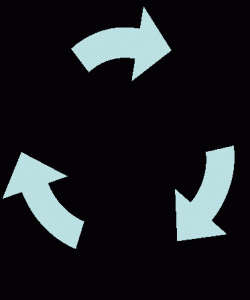Academic Publishing: One Big Racket

"Who are the most ruthless capitalists in the western world?" George Monbiot of the Guardian asks in a recent article. Scanning this week's headlines alone, one would find any number of viable candidates. Monbiot's answer: "While there are plenty of candidates, my vote goes not to the banks, the oil companies or the health insurers, but – wait for it – to academic publishers...Of all corporate scams, the racket they run is most urgently in need of referral to the competition authorities."
Why? According to Monbiot's argument, academic publishers trade in research that is mostly funded by universities and, in some cases, directly funded by the state. Professors write these articles; their peers evaluate and edit them. But, despite the fact that actual production is relatively inexpensive for the publishers, they charge universities and scholars premium prices for access. And, given the nature of the contemporary academic beast ("publish or perish," hypermodernism, etc.), Universities, despite everdwindling resources, continue to pay publishers' premium rates.
Imagine this scenario: A chef researches and finds a recipe he'd like to prepare for a culinary association's dinner party. He goes out and assembles the ingredients. He invites select friends over to give feedback on a few test-runs. They settle on a recipe. On the day of the recipe's grand unveiling, the servers, claiming that their part of the process--plating the food and delivering it to tables--is of cardinal importance, decide to charge anybody who eats any portion of the meal a premium for access. The guests, members of the culinary association, pay the premium. How could they not? They're suposed to know what the chef served.
Much the same thing is happening in academic publishing. Monbiot writes, "Universities are locked into buying their [academic publishers'] products. Academic papers are published in only one place, and they have to be read by researchers trying to keep up with their subject. Demand is inelastic and competition non-existent, because different journals can't publish the same material. In many cases the publishers oblige the libraries to buy a large package of journals, whether or not they want them all." With three for-profit companies (Reed Elsevier, Springer Science+Business Media, and John Wiley & Sons) accounting for 42% of articles published, academic publishing is a thriving racket for some.
As international finances take a beating and universities and libraries cut their available purchasing budgets, we must look deeply into both the contemporary ethics and future possibilities of academic publishing. Monbiot's a call to arms--that the rampant rentier capitalism in academic publishing must be stopped--was met with several strong responses. Numerous letters echoed and added to his sentiment, and an article by Ben Goldacre titled "Academic publishers run a guarded knowledge economy" suggests that, with digital technology, this structure cannot and should not hold.
In making this claim, Goldacre investigates the case of Aaron Swartz. On 19.July.2011, Swartz was charged by the U.S. Attorney for Massachusetts with computer fraud, wire fraud, unlawfully obtaining information from a protected computer, and recklessly damaging a protected computer, because he downloaded roughly 4 million academic journal articles from JSTOR. JSTOR did not pursue prosecution, but the Attourney General has decided to continue, alleging that Swartz intended to offer the ill-gotten articles to the public free of cost.
Is Aaron Swartz a criminal, or is he a modern-day Robin Hood? Goldacre notes, "One major problem with the current publishing model is that it's hard to give access for free to the motivated public, while still gathering income from institutions." While this is true, how much income do academic publishers need to generate? A 2005 Deutsche Bank study indicates that margins sit somewhere around 40%; in 2010, according to Monbiot, "Elsevier's operating profit margins were the same (36%) as they were in 1998." These margins are unheard of in almost all other industries, so how do are they acceptable in academic publishing?
What, if anything, can governments and universities do to shift the current structure of academic publishing? Monbiot suggests we utilize the possibilities of digital technology: "In the short term, governments should refer the academic publishers to their competition watchdogs, and insist that all papers arising from publicly funded research are placed in a free public database. In the longer term, they should work with researchers to cut out the middleman altogether, creating – along the lines proposed by Björn Brembs of Berlin's Freie Universität – a single global archive of academic literature and data. Peer-review would be overseen by an independent body. It could be funded by the library budgets which are currently being diverted into the hands of privateers."
I couldn't agree with him more.